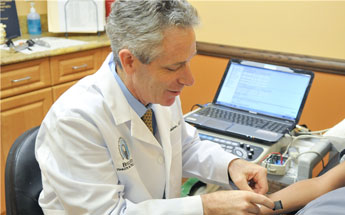EMG & Nerve Conduction Tests

Electromyography, or EMG, is used to diagnose nerve and muscle dysfunction and spinal cord disease. It records the electrical activity from the brain and/or spinal cord to a peripheral nerve root (found in the arms and legs) that controls muscles during contraction and at rest.
EMG and Nerve Conduction Studies consist of nerve tests and muscle tests which help the doctor determine how the nerves and muscles are functioning. This can diagnose nerve damage, pinched nerves, neuropathy, nerve pain, muscle spasm, and back and neck problems. These tests can be critical to the diagnosis of a chronic pain or neuromuscular condition.
The test should be performed by or supervised by a physician who has special training in diseases of the peripheral nerves and muscles. The electrical conducting properties of the nerves are measured and it is determined whether the nerves are healthy, pinched in a certain location, or diffusely affected by disease. Information about how the muscles work also shows if the nerves sending messages to those muscles are healthy or damaged.
During an EMG, very fine wire electrodes are inserted into a muscle to assess changes in electrical voltage that occur during movement and when the muscle is at rest. The electrodes are attached through a series of wires to a recording instrument. Testing usually takes place at a testing facility and lasts about 20-40 minutes, depending on the number of muscles and nerves to be tested. Most patients find this test to be somewhat uncomfortable.
An EMG is usually done in conjunction with a nerve conduction velocity (NCV) test, which measures electrical energy by assessing the nerve’s ability to send a signal. A technician or doctor tapes two sets of flat electrodes on the skin over the muscles. The first set of electrodes is used to send small pulses of electricity (similar to the sensation of static electricity) to stimulate the nerve that directs a particular muscle. The second set of electrodes transmits the responding electrical signal to a recording machine. The physician then reviews the response to verify any nerve damage or muscle disease.
Patients who are preparing to take an EMG or NCV test may be asked to avoid caffeine and not smoke for 2 to 3 hours prior to the test, as well as to avoid aspirin and non-steroidal anti-inflammatory drugs for 24 hours before the EMG. There is mild discomfort and minimal risk associated with this test.
Dr. Friedman has over 20 years of experience in performing these tests and is a nerve and muscle specialist.
For a detailed description of EMG & Nerve Conduction Tests, visit American Association of Neuromuscular & Electrodiagnostic Medicine's FAQ.
ADDITIONAL INFORMATION | Learn More About an EMG
(You may obtain a copy of this brochure at our office.)
